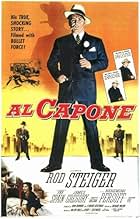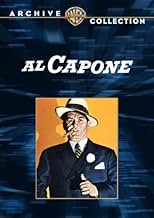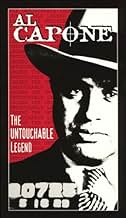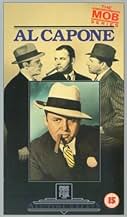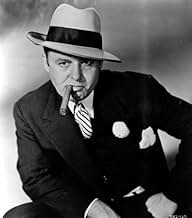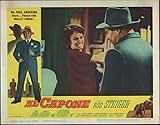Al Capone
- 1959
- Tous publics
- 1h 44min
NOTE IMDb
6,7/10
2,1 k
MA NOTE
Ajouter une intrigue dans votre langueA chronicle of the rise and fall of Chicago crime boss Al Capone during the Prohibition era.A chronicle of the rise and fall of Chicago crime boss Al Capone during the Prohibition era.A chronicle of the rise and fall of Chicago crime boss Al Capone during the Prohibition era.
- Réalisation
- Scénario
- Casting principal
- Récompenses
- 1 victoire et 1 nomination au total
Raikin Ben-Ari
- Ben Hoffman
- (as Ben Ari)
Fred Aldrich
- Funeral Spectator
- (non crédité)
Cindy Ames
- Nurse
- (non crédité)
Avis à la une
This 1959 picture is yet another cinematic retelling of the life of mobster Al Capone, and is better than most I've seen. Rod Steiger as Big Al seems miscast at first but wins me over in the end. Steiger was a born ham, but a fine actor for all his Methodish mannerisms, and has moments in the movie in which he's almost hypnotically effective. Yes, it's a performance, I kept on telling myself, but so was Capone himself. Over the top, perhaps, but Capone was himself more than a little touched, and Steiger nails this aspect of Capone to perfection, and is more effective in capturing the big guy's capriciousness than Robinson or Muni before him. Steiger's Capone isn't merely a gangster, he's a man possessed.
Director Richard Wilson's keeps this fairly modestly budgeted film moving at a fast pace, and it's never boring. In supporting roles, Fay Spain, Martin Balasm, James Gregory and Nehemiah Persoff are all effective. The black and white of this film evokes the late fifties more than the roaring twenties, and the movie at times feels a little like an episode of The Untouchables, at other times like Some Like It Hot. The Jazz Age was itself hot as the Eisenhower era was drawing to a close. F. Scott Fitzgerald's novels were coming back into vogue. O'Neill revivals on and off-Broadway were becoming commonplace. Al Capone captures this nostalgic mood, but really makes me nostalgic for the fifties more than for the twenties, for a time when fairly recent history could still be viewed as larger than life, the stuff of serious art and contemplation, not just fashionable nostalgia. Al Capone the movie is more nostalgia than serious art, but it touches on important issues, concerning violence, friendship, the role of government and the press as they pertain to and often collude with the criminal element, that still resonate today.
Director Richard Wilson's keeps this fairly modestly budgeted film moving at a fast pace, and it's never boring. In supporting roles, Fay Spain, Martin Balasm, James Gregory and Nehemiah Persoff are all effective. The black and white of this film evokes the late fifties more than the roaring twenties, and the movie at times feels a little like an episode of The Untouchables, at other times like Some Like It Hot. The Jazz Age was itself hot as the Eisenhower era was drawing to a close. F. Scott Fitzgerald's novels were coming back into vogue. O'Neill revivals on and off-Broadway were becoming commonplace. Al Capone captures this nostalgic mood, but really makes me nostalgic for the fifties more than for the twenties, for a time when fairly recent history could still be viewed as larger than life, the stuff of serious art and contemplation, not just fashionable nostalgia. Al Capone the movie is more nostalgia than serious art, but it touches on important issues, concerning violence, friendship, the role of government and the press as they pertain to and often collude with the criminal element, that still resonate today.
Rod Steiger is excellent as the famed Italian-American gangster Al Capone. When you see him speaking Italian and getting hurt feelings when someone disrespects him, it makes you wonder (if you haven't already) why Marlon Brando was cast as the titular role in The Godfather, when so many other actors would have done a better job. Rod is so great in this role, it dampens others who have subsequently played Capone. Why was it necessary to keep making biopics when Scarface (the original) and Al Capone were so well-acted?
In the supporting cast, you'll see Martin Balsam, James Gregory, and Nehemiah Persoff. There's a pretty big focus on Capone's Achille's heel: Fay Spain. He's an enormously powerful man who gets his way always, and yet he's completely vulnerable to Fay's affections. He brings her expensive presents and dresses her well, but when she still doesn't love him, he feels worthless and unappreciated. I didn't understand why he didn't just move on and get another mistress, but then again, people are often drawn to those who will hurt them.
If you like Rod Steiger, check out this lesser known drama. It's filmed in a very old, 1930s style to pay tribute to the gangster period. It probably wasn't a hit at the time because movies like Ben-Hur, Journey to the Center of the Earth, and North by Northwest were big spectacles in Technicolor and full of action. This is a black-and-white nostalgia piece that reminds viewers of Prohibition and the Great Depression. It's well-done, but it's definitely stylized.
In the supporting cast, you'll see Martin Balsam, James Gregory, and Nehemiah Persoff. There's a pretty big focus on Capone's Achille's heel: Fay Spain. He's an enormously powerful man who gets his way always, and yet he's completely vulnerable to Fay's affections. He brings her expensive presents and dresses her well, but when she still doesn't love him, he feels worthless and unappreciated. I didn't understand why he didn't just move on and get another mistress, but then again, people are often drawn to those who will hurt them.
If you like Rod Steiger, check out this lesser known drama. It's filmed in a very old, 1930s style to pay tribute to the gangster period. It probably wasn't a hit at the time because movies like Ben-Hur, Journey to the Center of the Earth, and North by Northwest were big spectacles in Technicolor and full of action. This is a black-and-white nostalgia piece that reminds viewers of Prohibition and the Great Depression. It's well-done, but it's definitely stylized.
This movie is the best presentation of "Al Capone" that I've ever seen. The movie is presented in a "Doccumentary" format which kept me "rivited" to the screen. This cast is an "All Star Cast" to say the least. Rod Steiger did an excellant job playing the character of "Al Capone" and as far as I'm concerned, has set the "standard" for other Actors to follow on how to play that particular character. I've seen the character of "Al Capone" played by Robert Di Nero, Jason Robards, Neville Brand, & Al Pacino, but NOBODY played him like Rod Steiger!!!
Also, when you have supporting cast members like Fay Spain, Martin Balsam & Neamiah Persoff, the production in my opinion can't help but be a hit. The way this Movie was put together gives it the ability to be relevant in just about any era. Even though it was filmed in 1959, it didn't show any signs of being "outdated" or "out of touch" in any way.
Once again, a great movie with some great acting in it. I would highly reccomend this movie to anyone.
Also, when you have supporting cast members like Fay Spain, Martin Balsam & Neamiah Persoff, the production in my opinion can't help but be a hit. The way this Movie was put together gives it the ability to be relevant in just about any era. Even though it was filmed in 1959, it didn't show any signs of being "outdated" or "out of touch" in any way.
Once again, a great movie with some great acting in it. I would highly reccomend this movie to anyone.
It's 1919 Chicago. Al Capone (Rod Steiger) is new in town. Nationwide Prohibition begins in 1920. The violent thug rises to be a top gangster.
This is a brutal depiction of the crime figure. It does have his prominent face scar. I don't always remember it being that prominent although the man is nicknamed Scarface. Overall, the performance has a realistic brutality. It's a rather straight forward biopic. I'm not sure how much new is being done here. Rod Steiger seems to have a dash of Brando but he's not at that level of charisma. The power is present. Others have done it bigger. Nevertheless, it's a very worthy performance.
This is a brutal depiction of the crime figure. It does have his prominent face scar. I don't always remember it being that prominent although the man is nicknamed Scarface. Overall, the performance has a realistic brutality. It's a rather straight forward biopic. I'm not sure how much new is being done here. Rod Steiger seems to have a dash of Brando but he's not at that level of charisma. The power is present. Others have done it bigger. Nevertheless, it's a very worthy performance.
Like so many mid-century biographical films, Al Capone marches through the man's life, giving equal weight to each way-point. It also fails miserably by providing no psychological or historical context for how he became one of crime's most notorious characters. In fact, the film succeeds in white-washing this killer. He woos the widow of one of his victims. He repeatedly makes the point that he's never been convicted of any crime. People die, but there is no depiction of Capone's ruthless, brutal side. Rod Steiger in the title role does an admirable job with the shallow script, but this is not enough to make the film worth watching. Oddly, there's no mention of Elliot Ness and when it comes to summing up Capone's end, we're told he died of "an incurable disease." What, audiences in 1959 couldn't handle the word "syphilis"?
Le saviez-vous
- AnecdotesMartin Balsam's character, Mac Keeley, was based on a real-life Chicago Tribune reporter named Jake Lingle. Lingle, a "legman" who ran down gang-related stories for the paper, had close ties to Al Capone and other gangsters as well as the notoriously corrupt Chicago Police Department, and he was well-paid by both mobsters and a police commissioner as a "go-between." Lingle was gunned down on June 9, 1930, much as depicted in the movie, after "getting too big for his hat", as Capone put it, and demanding too much for his services (though a Capone rival likely paid for the hit). Apparently legal concerns prevented the producers of this film from using Lingle's name. However, just a few months after this film was released, the TV series Les incorruptibles (1959) told Lingle's story in its third episode and used his actual name.
- GaffesAl Capones had two scars on his left cheek according to actual (if rare - Capone disliked being photographed to show them as is correctly pointed out in the film) photos. The depiction in films like L'Affaire Al Capone (1967) and Capone (1975) is closer to the truth.
- Citations
Al Capone: Nobody leaves Al Capone, you understand that?
Maureen Flannery: Well I do!
Al Capone: Oh no, you don't!
Maureen Flannery: Would you do me a favor please? Would you kill me?
- ConnexionsEdited into The Mystery of Al Capone's Vaults (1986)
Meilleurs choix
Connectez-vous pour évaluer et suivre la liste de favoris afin de recevoir des recommandations personnalisées
- How long is Al Capone?Alimenté par Alexa
Détails
- Date de sortie
- Pays d’origine
- Langue
- Aussi connu sous le nom de
- The Al Capone Story
- Lieux de tournage
- Société de production
- Voir plus de crédits d'entreprise sur IMDbPro
Box-office
- Budget
- 550 000 $US (estimé)
- Durée1 heure 44 minutes
- Couleur
- Rapport de forme
- 1.85 : 1
Contribuer à cette page
Suggérer une modification ou ajouter du contenu manquant


